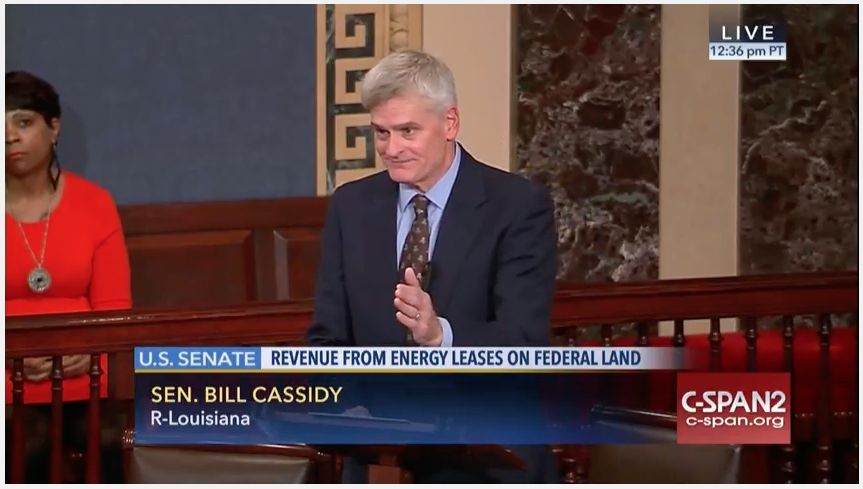|
WASHINGTON—Today, US Senator Bill Cassidy, MD (R-LA) spoke on the Senate floor advocating support for his bill, the American Energy and Conservation Act of 2016, which will be voted on Thursday in the Senate.
This legislation provides for more equitable offshore revenue sharing for energy producing states and makes investments in important conservation and coastal restoration projects.
Watch Dr. Cassidy’s full remarks here.
Dr. Cassidy’s remarks as prepared for delivery are below:
Thank you Mr. /Madam. President. Thank you to Majority Leader McConnell for following through on your commitment to allow a vote on the American Energy & Conservation Act of 2016 — introduced earlier this year by Senators Murkowski, Scott, Vitter, Tillis, Sullivan and me. Thank you to each one of you for your hard work. Also thank you to Senators Kaine and Warner for helping draft the Atlantic portion of the legislation and for cosponsoring an earlier version. This is a bi-partisan piece of legislation that uses an “all of the above” strategy to pursue true American energy independence. However, more than anything else, this legislation is about creating good paying middle-class American jobs.
A study conducted by Quest Offshore Resources, Inc. projects that this legislation could incentivize the creation of 280,000 new jobs by 2035. That same study estimates $194.5 billion in new investments and an additional $51 billion in cumulative government revenue. That’s $51 billion in new federal revenue this bill helps to unlock.
The American Energy and Conservation Act will benefit American families and small businesses by expanding opportunities for states to support energy development.
For years, energy activities in coastal Gulf States and adjacent offshore waters have produced billions of barrels of oil and trillions of cubic feet of natural gas for American energy consumers. These states support offshore energy development for the rest of the country and provide the support and pay for the infrastructure needed to bring this energy to market.
As with all development, there are increased costs associated with supporting increased traffic, additional use of local and state resources, as well as transportation corridors such as pipelines, vessels and trucks, in order to get the energy delivered to consumers all across the United States.
This is an “all of the above” energy jobs bill. This legislation includes language introduced by Senators Heller, Heinrich, Risch and Tester that streamlines the process for developing renewable energy on public lands while establishing the first ever revenue sharing paradigm for renewables. This legislation incentivizes tapping into the 27,000 megawatts of carbon-free energy that the Bureau of Land Management estimates could be provided by these projects.
Furthermore, if offshore revenue exists for oil and gas development, the same should be true of offshore wind development. That is why we used the same model established in GOMESA to extend revenue sharing to states that support offshore wind projects. This legislation thus incentivizes developing some of the 4,233 gigawatts of carbon-free generation that the BLM estimates is available for development off our coasts.
This is the American Energy and Conservation Act of 2016. This legislation makes significant investments in conservation projects all over the United States. This legislation provides an estimated $807 million for projects that increase access to public lands for hunting, fishing, and other outdoor recreational activities. This provision was included in Senator Murkowski’s Bipartisan Sportsmen’s Act of 2015, which 24 Senators have co-sponsored. The legislation makes investments in a variety of important programs, including the Payment in lieu of Taxes Program.
This legislation is supported by over 50 important stakeholder groups, including: National Association of Manufacturers, U.S. Chamber of Commerce, American Chemistry Council, American Petroleum Institute and Consumer Energy Alliance. These organizations understand that this legislation is a jobs builder and good policy for American workers.
I urge my colleagues to support this legislation. |
